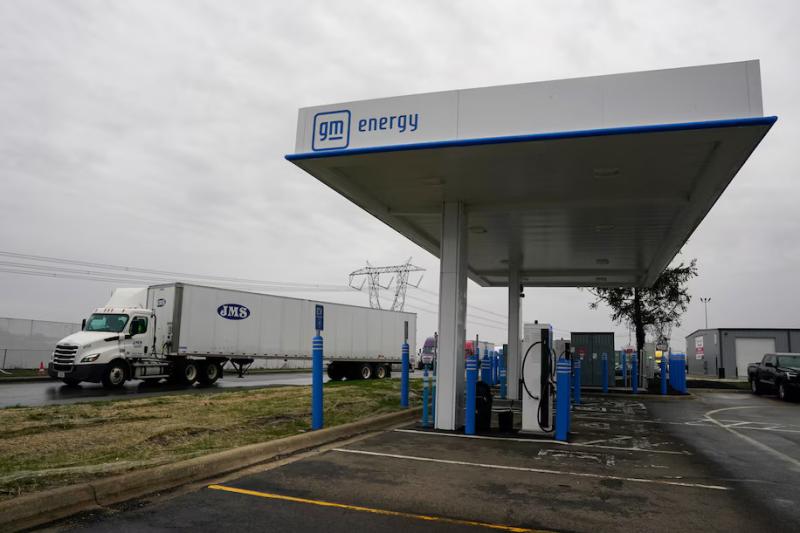Opinion | We built 7 EV chargers in 2 years. That’s actually not the problem.
By: Matt Bai (Washington Post)


Gee, Democrats habitually lie to the public about Big Government to justify spending boatloads of taxpayer money? And the unbiased liberal cheerleaders in the press actually think the public is too darned stupid to understand what's going on. Maybe these unbiased (and well paid) opinionators should follow Clinton's advice and get over themselves.
When did gaslighting the public that these Democrats are lying for the good of the country become the job of the Free Press? The (for profit) interpretation of the First Amendment by the unbiased liberal press obviously means that political misinformation from the left receives the highest protections. As Matt Bai points out, the unbiased press knows full well that Democrats are lying to the public but the highly paid cheerleading journalists will cover Democrats lies anyway.
It's not about the governments' role in public works. It's not about the good of the country. It's not about jobs. Democrats' Big Government lies have always been all about the money. That's both predictable and persuasive.

Well, that was predictable enough.
A little more than two years ago, as part of his landmark $1 trillion infrastructure law, President Biden announced the planned construction of half a million charging stations for electric vehicles by 2030.
As of this week, according to a Post report from Shannon Osaka, the program had completed exactly seven stations — room for 38 cars, if we're feeling generous.
The problem here isn't really the pace of the rollout, which, yes, makes your average kitchen remodeler look like a wizard of efficiency, but which is pretty typical for massive public projects.
No, the problem lies in the way the Democrats habitually mislead the public on the near-term impact of public investment — and usually end up paying the price.
I happen to believe the charger program makes a ton of sense. It has always been government's job to underwrite huge shifts in the infrastructure we use — railroads, highways, public schools. And we're never going to get people past their anxiety over electric cars until they know they can take a road trip without having to study a map of charging stations like Napoleon readying for battle.
But here's what infrastructure investments won't do. They won't create a ton of jobs, no matter what anybody tells you, because we build infrastructure in the same way we build everything else now — with way more machines than people. And they won't transform the country during any one administration (or even two), because it takes forever to coordinate all the federal and state agencies required just to get things off the ground.
Democrats know this. They knew it in 2009, when the newly installed Obama administration hailed its $800 billion stimulus program as a job-creating successor to the New Deal — only to see a frustrated electorate quickly sour on it. And they knew it in 2021, when they framed two major investment bills, totaling more than $3 trillion, as an effort to rapidly remake the economy.
They know this, and yet a legion of pollsters are always on hand to tell them that they have to "message" government spending in a more facile way, so as not to lose elections. The built-in assumption here, left over from the painful reckoning of American liberalism in the late 20th century, is that the public won't tolerate your spending a ton of money because you think it will benefit the country decades from now.
Everything has to be a jobs program. Everything has to pay dividends now.
And so the party of activist government continually falls into the same trap. To pass big spending bills, Democratic presidents and lawmakers foster wildly unrealistic impressions of how fast that spending will happen, how visible it will be, how precious little waste will result. They journey to deserted downtowns to tell us how many new factories it will create.
And then, as sure as the return of summer mosquitoes to the Tidal Basin, they have to endure an endless drip of stories about how slowly and how inefficiently these public projects actually get done, and how little economic impact they're actually having.
It's a dumb strategy, for a couple of reasons. First, it's always better in politics — assuming you really believe in what you're doing — to marshal your truest argument for what's best, rather than trying to sneak your agenda through on some false pretense. Invariably, when you do that, you end up getting less credit for the things you ultimately achieve and all kinds of blame for the things you don't.
Second, the presumed bias among voters against long-term investments is probably outdated. Unlike 20 years ago, most voters get the scope of the perils we face both in terms of economic competition and climate change, even if they disagree about the solutions. They're not so myopic as to care only about next year.
So maybe Democrats could simply level with them and say: Look, we need to start spending trillions of dollars on public investments, and we probably aren't going to see benefits of it anytime soon, but your children absolutely will.
You can't be an effective champion for the idea of public spending if you're always setting us up to be disappointed by the reality of it. Maybe all your wishful projections of new industries sweeping the nation overnight will help you win an election, but inevitably it leads to more skepticism and makes it that much harder to argue for investments we're still going to need.
Why would anyone trust Washington to spend money when all they know is that we were supposed to get someinstant utopiaof cheap electric cars, and all we got instead were 38 freaking chargers?
Predictable, sure. Persuasive, no.





Seven chargers in two years isn't unexpected. The public well understands that Biden was lying when he made the promises. What is most galling is the assumption by the unbiased cheerleaders in the liberal press that the public is so frickin' stupid that they have no clue they're being lied to.
Yeah, the public knows that Democrats' politics is just a game. And the public understands that the modern press are players in that game. The public realizes that even if the government installs the promised EV chargers, they'll be outmoded, obsolete, and require replacement before the Big Government program can possibly be completed. The public is well aware Democrats' promises are nothing but pandering to excuse political payoffs, kickbacks, and pass throughs. How else can the rich become richer?